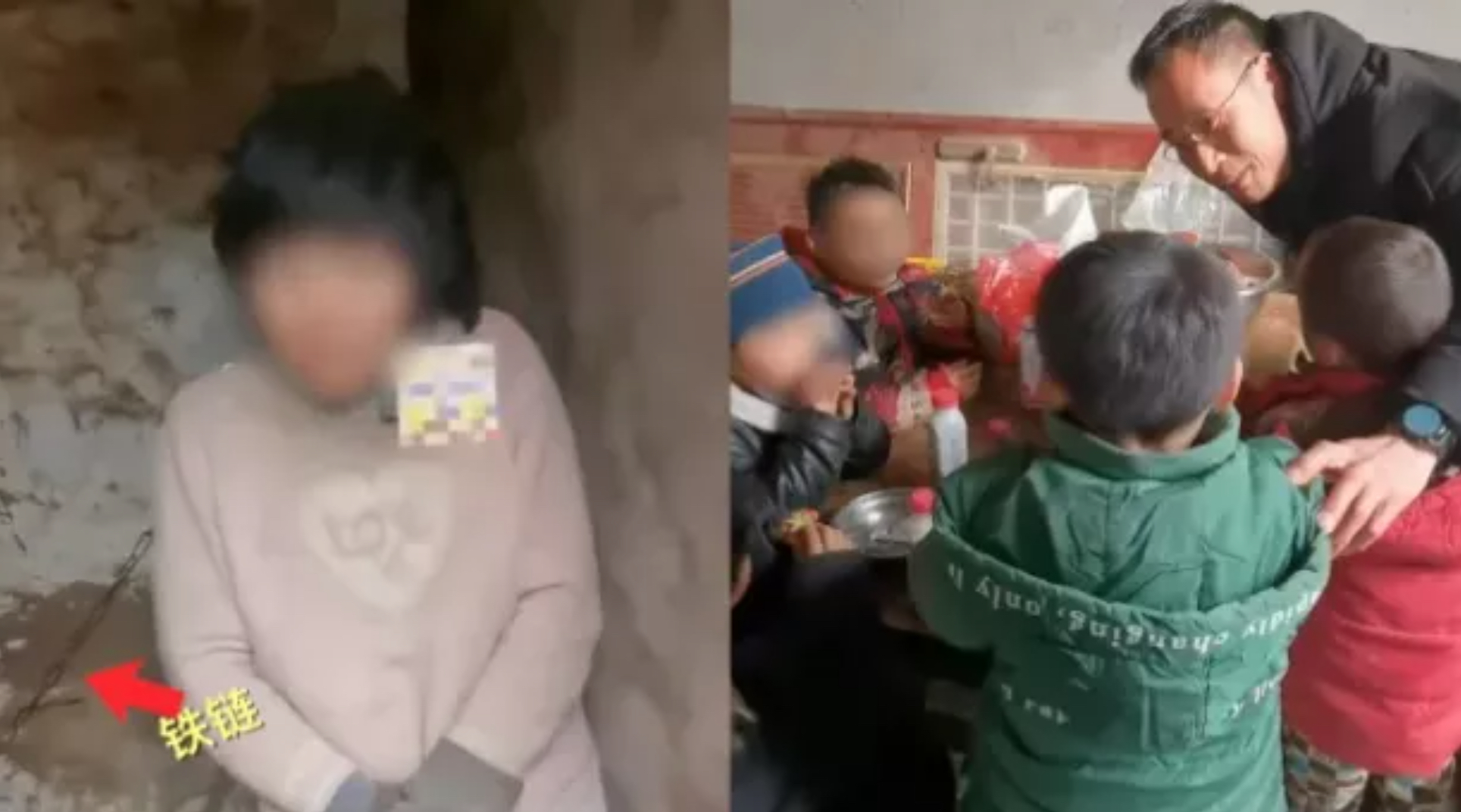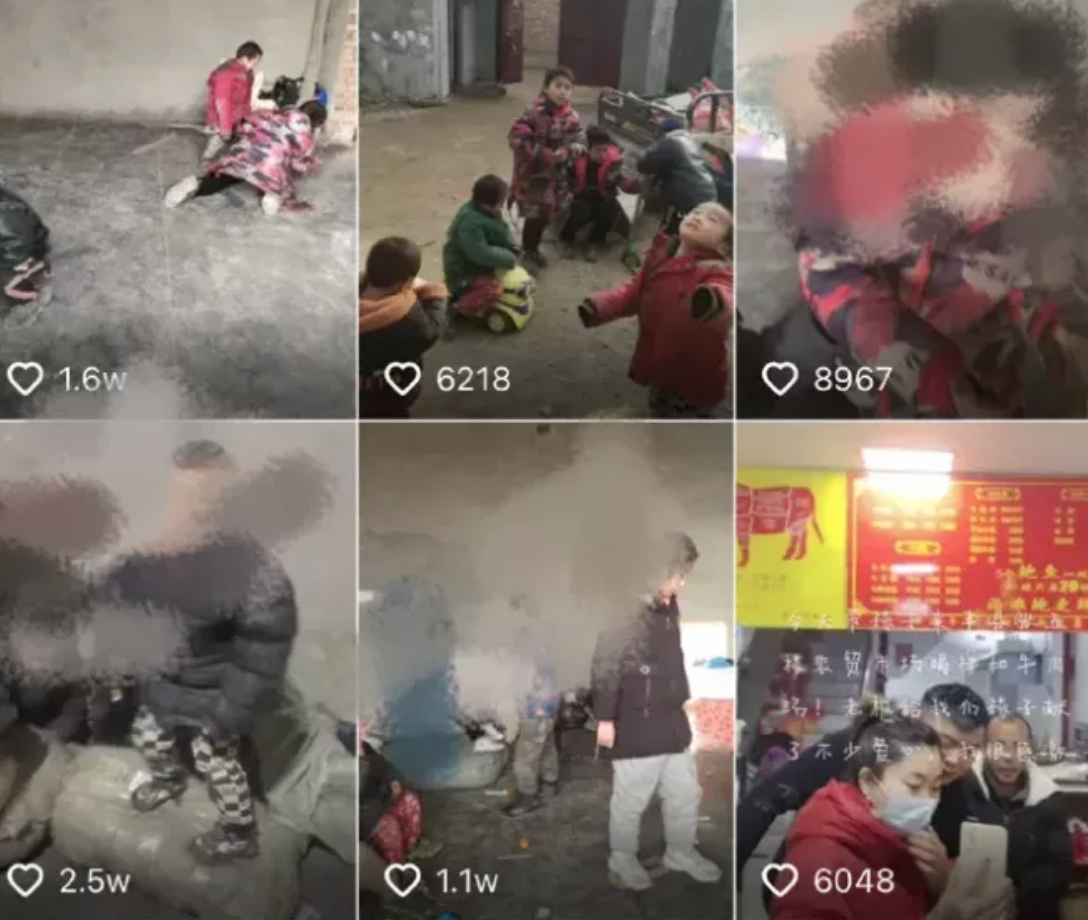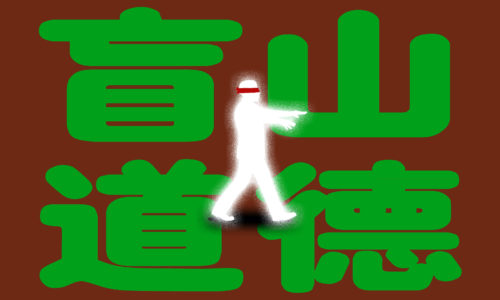Disturbing video of chained-up mother in rural China sparks outrage, calls for investigation
She seems unable to communicate and unable to give consent for anything, but she has eight children. What’s going on?

The two-minute video (originally at this URL but now deleted) was shocking in its raw depiction of horror and cruelty: A middle-aged Chinese woman, seemingly dazed and confused, stood in a doorless, shabby shack — with a metal chain tied to her neck and nailed to the wall. It was freezing cold in the winter, but the woman was wearing no coat. Next to the shed was a warm house where her husband and eight children resided. When asked about the woman’s situation, one of her kids said with an emotionless expression on his face that food was brought to her every day.
Apparently appalled by what he saw, the person filming the video brought some clothes to the woman and helped her put on a jacket , but she was unable to put her gratitude into words. Staring into the camera, the man said, “Everybody please take a look. What has this woman been through in this weather? Where did our compassion go?”
Even as violence against women has become an increasingly visible and talked-about issue in China, the video — uploaded last week to Douyin, the Chinese version of TikTok — touched a fresh nerve. The sheer grimness of the woman’s living conditions, coupled with the seeming indifference of her children, caused another wave of fear and outrage for Chinese women already worn down by a steady stream of domestic abuse stories in the past few years.
China news, weekly.
Sign up for The China Project’s weekly newsletter, our free roundup of the most important China stories.
As the footage went viral on Chinese social media, generating millions of views in a matter of days, concerned internet users wondered who she was, how she was locked up, and whether she was abused or taken advantage of by her husband.
Rumors started to swirl that the woman was a victim of human trafficking and that her mental health issues were caused by years of torture and beating by her husband. Many said the video made them think of the 2007 Chinese film Blind Mountain, which tells the story of a young woman who was kidnapped and sold to a small farming family in the mountains.
“People in her village told me that she was an educated woman when she first appeared. She was completely sensible and even knew how to speak English,”an anonymous source wrote (in Chinese) on Douyin. “It was the long-term abuse by her husband that made her a mentally-challenged person. She had all of her teeth pulled out because of her resistance.”
As calls for investigation grew, the local government of Xuzhou, Jiangsu Province, where the woman was found, put out a terse statement (in Chinese) on Friday, saying that the mother of eight, who was identified by her last name Yang, married her husband, surnamed Dong, in 1998 and was not a victim of abduction.
Due to Yang’s frequent episodes of violent outbursts, Dong had to separate her from the rest of the family, local authorities said. But to ensure that the kids have “a warm Lunar Chinese New Year,” Yang “has been sent to a hospital for treatment for her mental illness” and the family, which is registered by the local government as a household living below the poverty threshold, “has been given further financial assistance.”
But the response did little to quell the uproar on social media, where many continued to criticize authorities for leaving many questions answered in its hasty closure of the investigation. “Where are her parents? Who made her toothless? Who put a chain on her? How was she able to have eight children as a mentally-challenged woman? We need answers to these questions!” a Weibo user commented (in Chinese), while another person wrote (in Chinese), “Looks like the government wants to sweep everything under the rug with this statement and hopes that people will be distracted from talking about this during the Spring Festival holiday,”
Some also took aim at Weibo, accusing the site of censoring online discussion of the case and manipulating its list of trending topics. They claimed that the hashtag “a mother of eight in Xuzhou” #徐州八个孩子的妈妈#, was disabled by the platform after attracting over 800 million views. Other hashtags related to the matter could not be found on Weibo’s trending topics list, even though they had more views than the ones that made it.
A fuller picture of Dong’s family also emerged as the controversy continued. Internet sleuths discovered that the husband had become a local celebrity last year after appearing in a series of Douyin videos where he showed off his big family and seven sons. Because it’s traditionally considered good luck in Chinese culture to have many sons, many content creators on Douyin sought Dong out for interviews, asking him about parenting advice and bringing snacks to the children. Although it didn’t take long for Dong to capitalize on the attention and create his own Douyin account, Yang never appeared in his or other people’s clips until the viral video last week.

In one of his videos, which had thousands of views before his Douyin account got shut down over the weekend, Dong revealed that he was looked down upon by people in his village for getting married after 30. “It’s impossible that all of my eight children will be losers. I need to send them to schools despite our financial difficulties,” he said.
In a further attempt to put the controversy to rest, the local government of Xuzhou issued a longer follow-up statement (in Chinese) on Sunday, saying that an investigation had been reopened to determine whether Dong had illegally kept Yang in confinement. However, the new statement maintained that Yang had not been trafficked, adding that she was given shelter by Dong’s father in 1998 when living homeless on the streets and was diagnosed with schizophrenia after being married to Dong.
The explanation still left many internet users dissatisfied. “Did Dong’s father actually give Yang a second family? Or did he take home a mentally-challenged woman and use her as a free reproductive tool?” a Weibo user questioned (in Chinese). Citing Chinese laws on sexual consent for people with intellectual disabilities, others argued that is illegal for Dong to be intimate with Yang given her inability to provide consent.
As a result of China’s longstanding one-child policy and a traditional preference for sons in Chinese families, the country now has a major gender imbalance, particularly among people who are of child-bearing age. Predictions say that by 2020, China will have 30 million bachelors, sometimes called guanggun (光棍 guānggùn), or “bare branches.” The difficulty many Chinese men — especially those in the countryside — now face finding wives, combined with a lack of protections in China, has led to a brutal business of bride-trafficking, where women and girls, especially those with intellectual disabilities, are captured by traffickers and sold to families in remote villages.
The controversy has also drawn renewed attention to the persistent problem of domestic violence in China. Despite a number of initiatives from the government and activist groups to stop gender-related crimes, about one in four women have suffered physical or verbal abuse, or had their freedoms restricted by their partners, according to the All-China Women’s Federation, a state-controlled organization tasked with advocating for Chinese women. China is one of 10 countries that has not criminalized rape in marriage, an issue not resolved by its Anti-Domestic Violence Law, which has been poorly enforced since its introduction in 2015.






